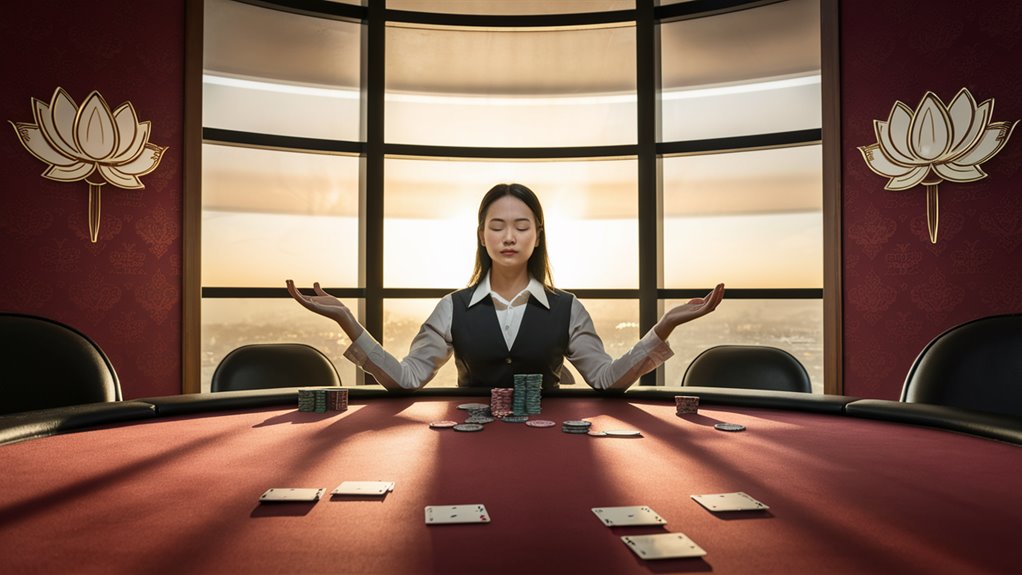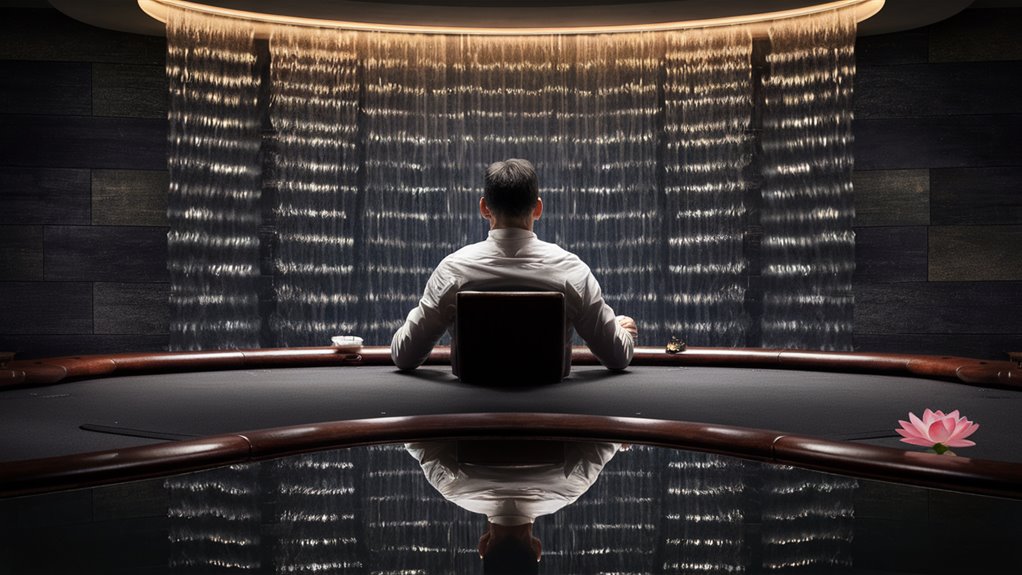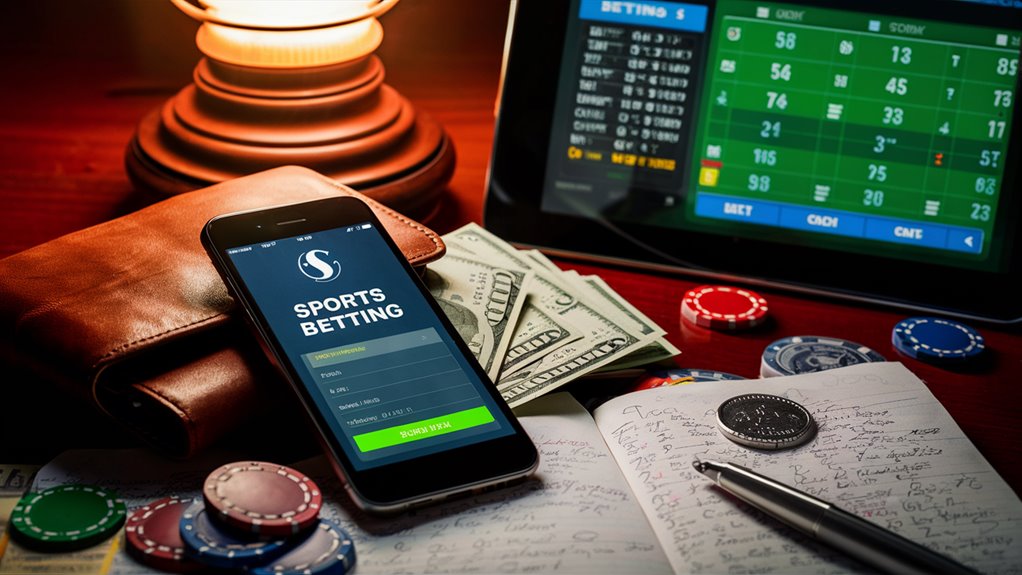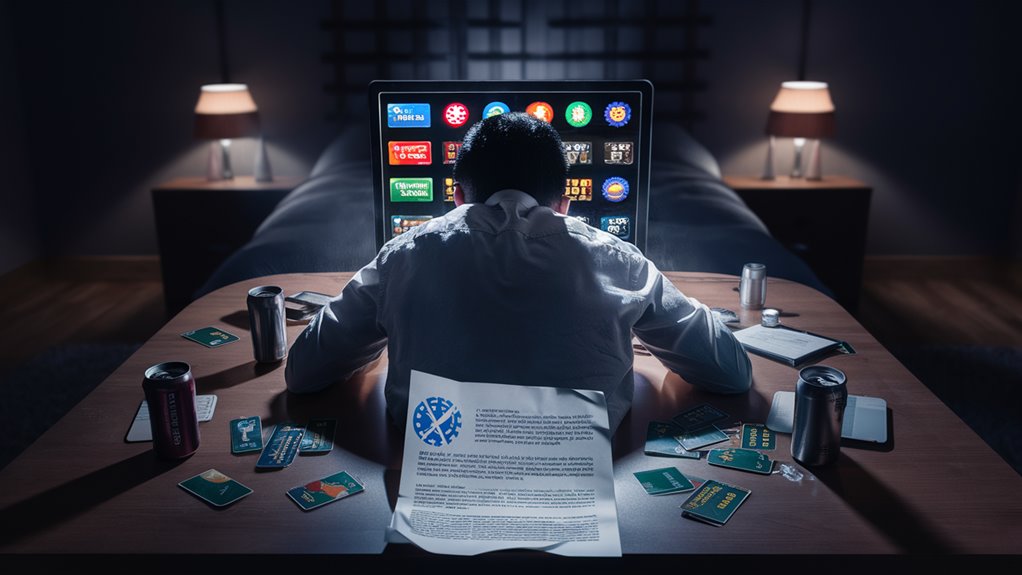Mastering Emotional Tilt at the Casino: The Lotus Arc Method
*Emotional control* in casino gaming requires a sophisticated blend of *mindfulness techniques* and *psychological strategies*. The *Lotus Arc method* presents a revolutionary approach to maintaining composure during high-stakes gambling situations through proven *zen-based practices*.
Core Components of the Lotus Arc System
Mindful Breathing Techniques
The foundation of emotional stability lies in the *4-4-4 breathing pattern*, which involves:
- *Four-second inhale*
- *Four-second hold*
- *Four-second exhale*
Physical Grounding Practices
*Strategic muscle engagement* helps players maintain awareness and prevent emotional escalation through:
- *Systematic body scanning*
- *Posture alignment*
- *Tension release protocols*
Implementation Timeline
The *optimal development period* spans 4-6 weeks, with progressive mastery of:
- Week 1-2: *Breathing fundamentals*
- Week 3-4: *Environmental anchoring*
- Week 5-6: *Integration and stress testing*
FAQ: Emotional Control in Casino Gaming
Q: How does emotional tilt affect gambling decisions?
A: *Emotional tilt* impairs judgment, leading to irrational betting patterns and increased losses.
Q: What are the first signs of tilt?
A: Common indicators include increased heart rate, muscle tension, and aggressive betting behavior.
Q: How long does it take to master the Lotus Arc method?
A: Most players achieve significant improvement within 4-6 weeks of consistent practice.
Q: Can the Lotus Arc method be used in other high-stress situations?
A: Yes, these techniques are applicable to various pressure situations beyond casino gaming.
Q: What makes the Lotus Arc method different from other tilt control strategies?
A: The method uniquely combines ancient mindfulness practices with modern psychological research for comprehensive emotional management.
Creating Sustainable Results
Success with the *Lotus Arc method* requires:
- *Consistent daily practice*
- *Progressive skill building*
- *Regular assessment and adjustment*
- *Environmental awareness*
- *Emotional trigger identification*
The path to *emotional mastery* in casino gaming emerges through dedicated application of these principles, creating a foundation for sustained performance under pressure.
Understanding Casino Tilt

Understanding Casino Tilt: A Comprehensive Guide
The Psychology of Casino Tilt
*Casino tilt* represents a critical psychological state that can severely impact gambling decisions and outcomes.
This phenomenon occurs when emotions override rational thinking, leading to compromised judgment and potentially devastating financial consequences.
Common Triggers and Manifestations
*Problem gambling behaviors* frequently emerge from three primary tilt triggers:
- *Unexpected bad beats*
- *Extended losing streaks*
- *Perceived unfairness* in game outcomes
These triggers activate the brain’s stress response, releasing cortisol and adrenaline that impair strategic decision-making abilities.
The Destructive Cycle of Tilt
*Emotional gambling* creates a self-reinforcing cycle where each tilted decision compounds previous errors.
The psychological impact manifests through:
- Increased bet sizing
- Abandonment of strategic principles
- Chase behavior after losses
- Diminished risk assessment capabilities
Prevention and Management Strategies
*Responsible gambling* requires implementing effective tilt management techniques:
- Setting strict loss limits
- Taking mandatory breaks
- Maintaining detailed session logs
- Practicing mindfulness techniques
#
Frequently Asked Questions
Q: What’re the early warning signs of casino tilt?
A: Key indicators include increased heart rate, aggressive betting patterns, and emotional decision-making.
Q: How long should I take a break after experiencing tilt?
A: A minimum 24-hour cooling-off period is recommended to reset emotional equilibrium.
Q: Can tilt affect experienced players?
A: Yes, even professional gamblers can experience tilt, though they typically have better management strategies.
Q: Is tilt more common in certain casino games?
A: Tilt occurs most frequently in skill-based games like poker where players feel more control over outcomes.
Q: How can I develop tilt resistance?
A: Regular practice of bankroll management, emotional awareness, and strategic discipline builds tilt resistance.
These strategies help maintain control and preserve both your bankroll and mental well-being while gambling.
Ancient Wisdom Meets Modern Gaming
Ancient Wisdom Meets Modern Gaming: A Guide to Tilt Management
The Power of Eastern Philosophy in Gaming
*Ancient wisdom* and *modern gaming psychology* create a powerful framework for managing emotional challenges in competitive play.
*Eastern philosophical principles*, particularly mindfulness and detachment, offer proven strategies for maintaining peak performance during intense gaming sessions.
Core Principles for Tilt Management
Mindfulness in Gaming
*Buddhist principles of non-attachment* directly parallel optimal gaming mentality.
Players can learn to observe emotional responses without becoming controlled by them, maintaining strategic clarity while acknowledging natural reactions to gameplay challenges.
Three Essential Eastern Practices
- *Meditation techniques* – Develop present-moment awareness during gameplay
- *Breath control* – Master physiological responses in high-pressure situations
- 슬롯사이트 먹튀검증 – Maintain objectivity regardless of previous experiences
Practical Implementation
*Strategic awareness* combines with *traditional wisdom* to create effective tilt management techniques.
Players can develop a hybrid methodology that integrates ancient practices with modern competitive gaming demands, particularly valuable during high-stakes matches.
FAQ: Gaming and Ancient Wisdom
Q: How does mindfulness improve gaming performance?
A: Mindfulness enhances focus, reduces emotional reactivity, and improves decision-making during intense gameplay.
Q: Can meditation really help with gaming tilt?
A: Regular meditation practice strengthens emotional regulation and helps maintain composure during challenging gaming situations.
Q: How long does it take to see results from these techniques?
A: Most players notice improvements in tilt management within 2-3 weeks of consistent practice.
Q: What’s the best way to start implementing these practices?
A: Begin with simple breathing exercises between matches and gradually incorporate longer meditation sessions.
Q: How do professional gamers use these techniques?
A: Many pro players integrate pre-game meditation, breath work, and mindfulness practices into their regular training routines.
Advanced Integration
*Emotional mastery* in gaming requires consistent practice and integration of these ancient principles.
Understanding that emotional states are temporary and manageable through practiced awareness leads to improved performance and more enjoyable gaming experiences.
The Lotus Arc Method

The Lotus Arc Method: Mastering Emotional Control in Strategic Play
Understanding the Three-Point System
The *Lotus Arc Method* represents a revolutionary approach to *emotional control* and *strategic performance*.
This systematic technique creates a three-point awareness arc, drawing inspiration from the lotus flower’s natural symmetry to enhance decision-making under pressure.
Physical Awareness Point
*Body monitoring* forms the foundation of emotional mastery. Players learn to:
- Track breathing patterns
- Monitor heart rate fluctuations
- Assess muscle tension levels
*Counter-measures* include:
- *Deep breathing exercises*
- *Progressive muscle relaxation*
- *Posture adjustment techniques*
Mental Clarity Point
*Cognitive awareness* focuses on identifying and managing thought patterns during critical moments. Key elements include:
- Recognition of emotional triggers
- Interruption of negative thought cycles
- Maintenance of strategic focus
Strategic Recalibration Point
*Position assessment* and *tactical adjustment* comprise the final point:
- Objective situation analysis
- Parameter compliance checking
- Strategic position evaluation
Frequently Asked Questions
Q: How long does it take to master the Lotus Arc Method?
A: Most practitioners achieve basic proficiency within 4-6 weeks of consistent practice, with advanced mastery typically requiring 3-6 months.
Q: Can the Lotus Arc Method be applied to different types of strategic games?
A: Yes, the method’s principles are universally applicable across various strategic disciplines, from chess to competitive gaming.
Q: What makes the Lotus Arc Method more effective than traditional emotional control techniques?
A: The method’s integrated three-point system creates a comprehensive approach that addresses physical, mental, and strategic elements simultaneously.
Q: How often should one practice the Lotus Arc Method?
A: Daily practice sessions of 15-20 minutes are recommended for optimal results, with additional implementation during actual gameplay.
Q: Are there any prerequisites for learning the Lotus Arc Method?
A: No specific prerequisites exist, though basic familiarity with strategic gameplay and emotional awareness benefits initial learning.
Implementation Tips
- Start with *physical awareness* exercises
- Progress to *mental clarity* techniques
- Integrate *strategic recalibration* practices
- Monitor progress through performance metrics
- Adjust application based on individual responses
The Lotus Arc Method transforms emotional control from an abstract concept into a concrete, actionable system for strategic excellence.
Mindful Techniques at Play
Mindful Techniques for Strategic Gameplay
Mastering Breath Awareness
*Breath control* serves as a fundamental anchor for maintaining focus during intense gameplay.
The *4-4-4 breathing technique* transforms raw emotional responses into strategic advantages. By implementing controlled breathing – four counts in, four counts hold, four counts out – players establish a rhythmic pattern that grounds them in the present moment, preventing emotional decision-making.
Body Scanning for Peak Performance
*Strategic body scanning* enables players to identify and release physical tension before it impacts gameplay decisions.
This *mindfulness practice* involves systematically checking muscle groups from toes to head while maintaining game awareness. Recognizing physical stress signals like jaw clenching or shoulder tension becomes a valuable trigger for posture reset and mental recalibration.
Emotional Labeling as a Strategic Tool
*Emotional awareness* through labeling provides a powerful advantage in competitive settings.
By identifying and naming emotions without judgment – “This is disappointment” or “This is fear” – players create crucial mental space between triggering events and responses. This *mindful technique* effectively neutralizes emotional influences on strategic decisions.
FAQ: Mindful Gaming Techniques
Q: How quickly can mindful techniques improve gameplay?
A: Regular practice of mindful techniques typically shows noticeable improvements in decision-making within 2-3 weeks of consistent application.
Q: Can mindfulness techniques be practiced during intense gameplay?
A: Yes, these techniques are specifically designed for integration during active play, becoming more natural with regular practice.
Q: Which mindful technique is most effective for beginners?
A: Breath awareness is generally the easiest starting point, offering immediate benefits with minimal practice.
Q: How does emotional labeling enhance strategic thinking?
A: Emotional labeling creates mental distance from immediate reactions, allowing for more objective and strategic decision-making.
Q: What’re the long-term benefits of implementing mindful gaming techniques?
A: Regular practice leads to improved focus, better emotional regulation, and more consistent strategic performance across all gaming situations.
Beyond the Meditation Cushion

Beyond the Meditation Cushion: Mindfulness in Active Gameplay
Integrating Mindfulness into Casino Play
*Practical mindfulness* extends far beyond traditional meditation sessions, especially in high-pressure gambling environments.
*Strategic mindfulness integration* requires developing specific environmental triggers and behavioral anchors that transform casino surroundings into mindfulness cues.
극복을 위한 퀵 빌드 전략 적용 *smooth felt texture*, *chip weight*, and *rhythmic card shuffling* serve as powerful anchors for maintaining emotional equilibrium.
Creating Micro-Meditation Moments
*Strategic pause points* during gameplay provide natural opportunities for *mindfulness practice*. Key moments include:
- *Dealer transitions* for mental reset
- *Natural game breaks* for quick body awareness
- *Between-hand intervals* for controlled breathing exercises
Physical Anchors and Response Patterns
Establish *deliberate physical cues* linked to specific calming responses:
- *Watch adjustment* as a grounding technique
- *Posture realignment* for mental focus
- *Hydration moments* for emotional reset
## Frequently Asked Questions
Q: How can I maintain mindfulness during intense gameplay?
A: Develop automatic response patterns tied to specific casino triggers and establish regular micro-meditation moments during natural game pauses.
Q: What’re effective physical anchors for maintaining emotional control?
A: Use deliberate actions like touching your watch, adjusting posture, or taking measured sips of water as mindfulness triggers.
Q: How long should micro-meditation moments last?
A: Brief 15-30 second intervals during natural game breaks are sufficient for maintaining emotional balance.
Q: When is the best time to implement mindfulness techniques?
A: Practice these techniques before emotional escalation occurs to ensure they become automatic responses.
Q: How can I make mindfulness practice more consistent during gameplay?
A: Integrate mindfulness cues into your standard playing routine through regular practice and conscious habit formation.










